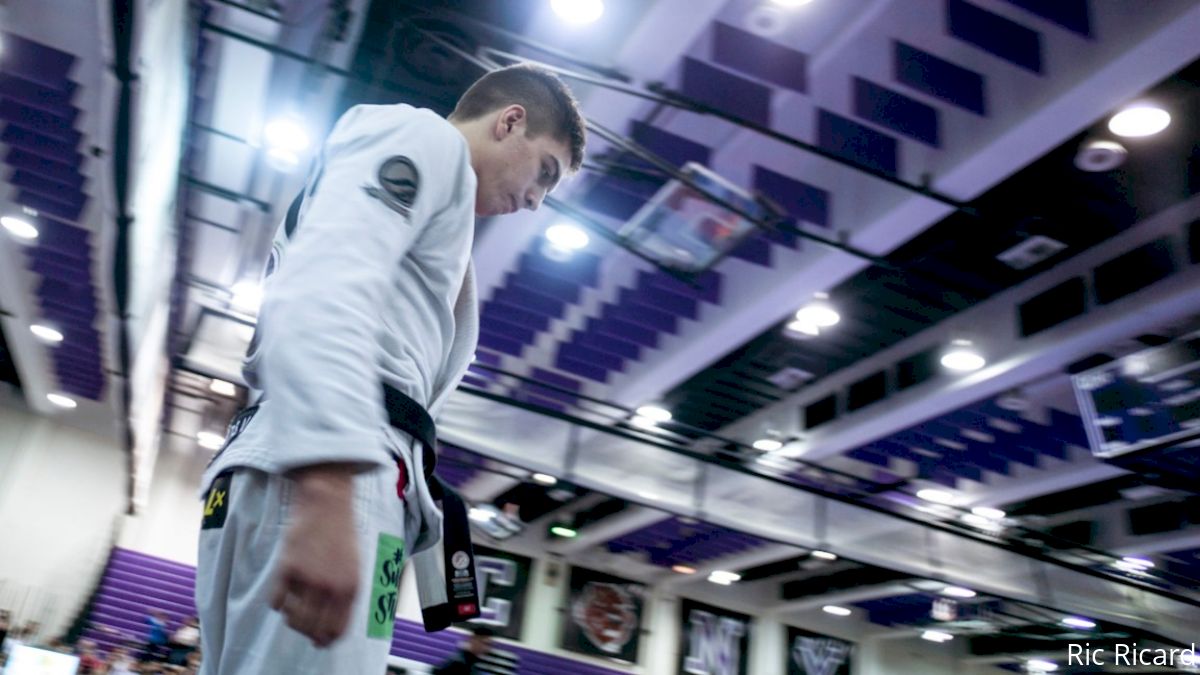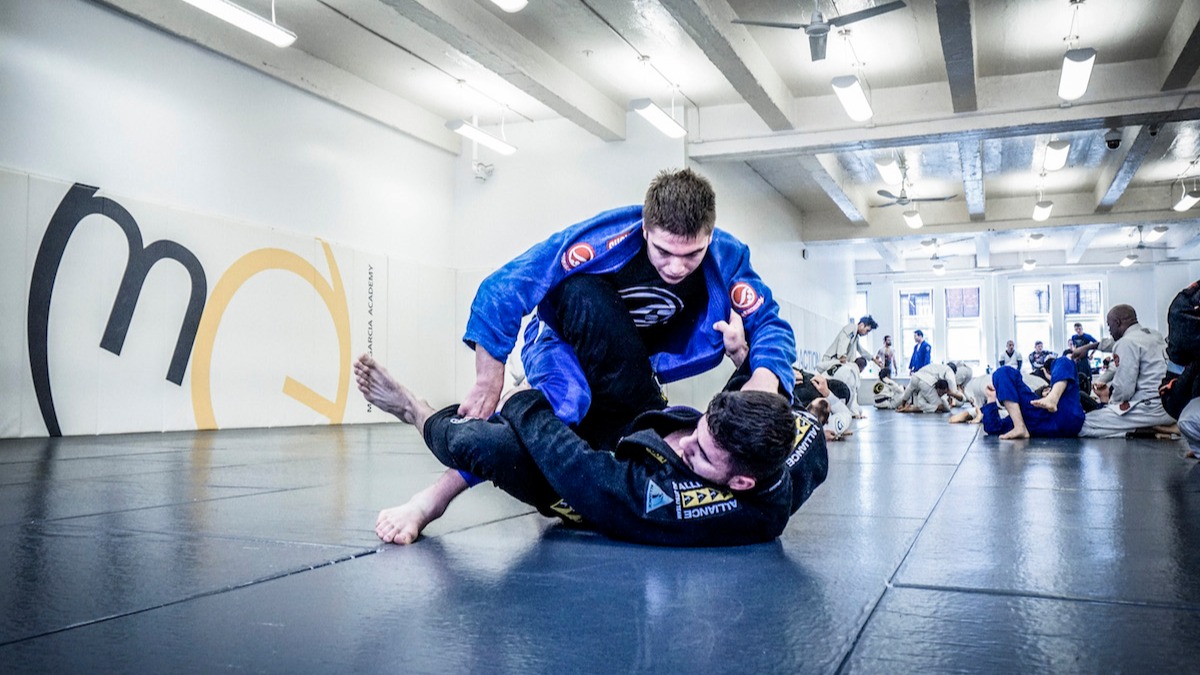Even Black Belts Struggle With Overcoming Competition Anxiety
Even Black Belts Struggle With Overcoming Competition Anxiety
Gianni Grippo writes for FloGrappling about the anxieties and mental stumbling blocks all grapplers deal with and how best to overcome them.

Gianni Grippo writes for FloGrappling about the anxieties and mental stumbling blocks all grapplers deal with and how best to overcome them.
I remember a couple of months back -- the day before the IBJJF No-Gi Pans -- when I was at the Marcelo Garcia Academy watching class and sitting alongside some of my teammates who were also resting for a big day of competition the following day.
I sat and talked with one of my blue belt teammates who told me about some of the anxieties he was dealing with leading up to the competition. He talked about how he had this tough guy and that tough guy in his division and so on. He also talked about how he never really feels fully prepared compared to how his opponents look in competition.
It's amazing how the mental game can shut down talent. I saw it happen to my blue belt teammate, who I know for a fact is very skilled in the training room but allows anxieties to get the better of him in competition. In years past, I had also seen this same trait in myself as I was coming up the ranks.

Photo: Ric Ricard
But the truth is that I've dealt with a number of anxieties leading up to competition -- and even during matches. I truly believe that these anxieties cost me victory more than anything my opponent was able to do.
I remember always feeling the need to over-analyze my opponents and over-strategize to the point that I would be taking myself out of my A-game. For example: "Oh, this guy is really good at passing the De la Riva guard, so maybe I should look to play single-leg X more with him instead." This was even though I knew I wasn't fully comfortable with my single-leg X.
All of this changed for me after I had a poor showing at the 2013 No-Gi Worlds.
I lost in the semifinals in my last tournament as a brown belt. I over-thought my opponents, conceded too much respect to their games and didn't focus enough on what made me good and what made me capable of taking gold. I found that even in the matches I won, I fought not to lose rather than to win.
That loss ended up being the best thing to happen to me as it forced me to seek help, and I began talking to a sports psychologist.
Gianni talks about his recent performance at the U.S. National Pro trials for Abu Dhabi World Pro and shows a nice 50-50 escape to guard pass he used in his matches:
To save time, though, the biggest and perhaps the simplest lesson I've learned over the years (and that I always repeat to myself in challenging or stressful moments) is "Focus on what you can control." It's that simple.
I can't control how my opponent prepares or what game he plays. I can't control the referees and the decisions they make.
So, what can I control?
Myself. I can control how I prepare both mentally and physically so that I can be optimally prepared for any task at hand.
Looking too much into what someone else may be doing only distracts me from my own preparations. Now my mindset goes more along the lines of, "Oh, that guy is really good at passing the De la Riva guard? Well good, it'll be a perfect opportunity for me to show how well my De la Riva game is coming along."
Don't let me give you with the idea that it isn't beneficial to look at your opponents. I still do today but not to the same degree I did a few years back. I look to get an idea of what their strong points are, just so I can have an idea of what to be wary of in a match, but that is all. There is no elaborate strategy; instead the goal is just to go in and force my game on my opponent rather than do something else because my opponent is a challenge in some way.
So keep a few things in mind:
You may also like:
Lessons On Competing From Leandro Lo And Marcelo Garcia
I remember a couple of months back -- the day before the IBJJF No-Gi Pans -- when I was at the Marcelo Garcia Academy watching class and sitting alongside some of my teammates who were also resting for a big day of competition the following day.
I sat and talked with one of my blue belt teammates who told me about some of the anxieties he was dealing with leading up to the competition. He talked about how he had this tough guy and that tough guy in his division and so on. He also talked about how he never really feels fully prepared compared to how his opponents look in competition.
It's amazing how the mental game can shut down talent. I saw it happen to my blue belt teammate, who I know for a fact is very skilled in the training room but allows anxieties to get the better of him in competition. In years past, I had also seen this same trait in myself as I was coming up the ranks.

Photo: Ric Ricard
When Anxiety Kills Confidence And Costs You Victory
From the outside people may look at me and think that I had my confidence running full gear at all times. Why wouldn't I, if I was able to come up through the ranks winning both Pans and Worlds at blue, purple, and brown belt (among other titles)?But the truth is that I've dealt with a number of anxieties leading up to competition -- and even during matches. I truly believe that these anxieties cost me victory more than anything my opponent was able to do.
I remember always feeling the need to over-analyze my opponents and over-strategize to the point that I would be taking myself out of my A-game. For example: "Oh, this guy is really good at passing the De la Riva guard, so maybe I should look to play single-leg X more with him instead." This was even though I knew I wasn't fully comfortable with my single-leg X.
All of this changed for me after I had a poor showing at the 2013 No-Gi Worlds.
I lost in the semifinals in my last tournament as a brown belt. I over-thought my opponents, conceded too much respect to their games and didn't focus enough on what made me good and what made me capable of taking gold. I found that even in the matches I won, I fought not to lose rather than to win.
That loss ended up being the best thing to happen to me as it forced me to seek help, and I began talking to a sports psychologist.
Gianni talks about his recent performance at the U.S. National Pro trials for Abu Dhabi World Pro and shows a nice 50-50 escape to guard pass he used in his matches:
How Sports Psychology Has Helped Changed My Mindset
Since that time, I have been talking regularly with my sports psychologist -- an hour-long Skype session at least three times a month. I cannot even begin to go over all the lessons I've taken on how to handle any and every challenging mental situation, whether it be in training or competition or even with things in everyday life. The assistance from someone outside my parents or teammates has been a game-changer for my mental approach to training and competing.To save time, though, the biggest and perhaps the simplest lesson I've learned over the years (and that I always repeat to myself in challenging or stressful moments) is "Focus on what you can control." It's that simple.
I can't control how my opponent prepares or what game he plays. I can't control the referees and the decisions they make.
So, what can I control?
Myself. I can control how I prepare both mentally and physically so that I can be optimally prepared for any task at hand.
Looking too much into what someone else may be doing only distracts me from my own preparations. Now my mindset goes more along the lines of, "Oh, that guy is really good at passing the De la Riva guard? Well good, it'll be a perfect opportunity for me to show how well my De la Riva game is coming along."
Don't let me give you with the idea that it isn't beneficial to look at your opponents. I still do today but not to the same degree I did a few years back. I look to get an idea of what their strong points are, just so I can have an idea of what to be wary of in a match, but that is all. There is no elaborate strategy; instead the goal is just to go in and force my game on my opponent rather than do something else because my opponent is a challenge in some way.
So keep a few things in mind:
- It is OK to talk to someone about your anxieties. Talking to an outside source is the perfect way to help problem solve and how to make something better.
- Focus on the things you can control. Focusing on what you cannot control, like your opponents, can only lead to stress and anxiety and distracts you from your preparation.
- Remember, everyone's highlight video on YouTube always makes them look much better than they actually are. Don't over think your adversaries, trust yourself!